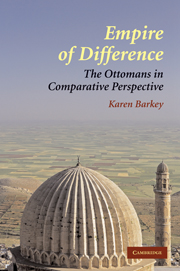Book contents
- Frontmatter
- Contents
- Preface
- Transliterations
- PART I AN IMPERIAL MODEL
- 1 Introduction
- 2 Emergence: Brokerage across Networks
- 3 Becoming an Empire: Imperial Institutions and Control
- 4 Maintaining Empire: An Expression of Tolerance
- 5 The Social Organization of Dissent
- PART II THE TRANSFORMATION OF THE EIGHTEENTH CENTURY
- Bibliography
- Index
- References
4 - Maintaining Empire: An Expression of Tolerance
Published online by Cambridge University Press: 05 September 2012
- Frontmatter
- Contents
- Preface
- Transliterations
- PART I AN IMPERIAL MODEL
- 1 Introduction
- 2 Emergence: Brokerage across Networks
- 3 Becoming an Empire: Imperial Institutions and Control
- 4 Maintaining Empire: An Expression of Tolerance
- 5 The Social Organization of Dissent
- PART II THE TRANSFORMATION OF THE EIGHTEENTH CENTURY
- Bibliography
- Index
- References
Summary
[L]et us suppose two churches – the one of Arminians, the other of Calvinists – residing in the city of Constantinople. Will anyone say that either of these churches has right to deprive the members of the other of their estates and liberty (as we see practiced elsewhere), because of their differing from it in some doctrines and ceremonies, whilst the Turks in the meanwhile silently stand by and laugh to see what inhuman cruelty Christians thus rage against Christians?
Let us get out of our grooves and study the rest of the globe. The Sultan governs in peace twenty million people of different religions; two hundred thousand Greeks live in security in Constantinople; the muphti himself nominates and presents to the emperor the Greek patriarch, and they also admit a Latin patriarch. The Sultan nominates Latin bishops for some of the Greek islands, using the following formula: “I command him to go and reside as bishop in the island of Chios, according to their ancient usage and their vain ceremonies.” The empire is full of Jacobites, Nestorians, and Monothelites; it contains Copts, Christians of St. John, Jews and Hindoos. The annals of Turkey do not record any revolt instigated by any of these religions.
John Locke wrote the “A Letter Concerning Toleration” in the seventeenth century; Voltaire wrote Toleration a century later. Both remain key texts that transcend the times and places of their composition.
- Type
- Chapter
- Information
- Empire of DifferenceThe Ottomans in Comparative Perspective, pp. 109 - 153Publisher: Cambridge University PressPrint publication year: 2008

